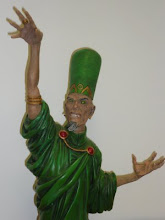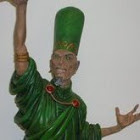 Clever and gripping, with a very smart narrative structure and strong central idea this is an unusual and very engaging story. Harold White is an obsessive Sherlock Holmes fan who at the moment of his greatest triumph finds himself thrust into a murder mystery that has distinctly Sherlock Holmes connections. In the second narrative Arthur Conan Doyle, having killed off his troublesome character finds himself, very unwillingly, drawn into a real murder case. The twists and turns of each case are cleverly set up and the connections between them emerge carefully and lead to a wonderfully satisfying conclusion.
Clever and gripping, with a very smart narrative structure and strong central idea this is an unusual and very engaging story. Harold White is an obsessive Sherlock Holmes fan who at the moment of his greatest triumph finds himself thrust into a murder mystery that has distinctly Sherlock Holmes connections. In the second narrative Arthur Conan Doyle, having killed off his troublesome character finds himself, very unwillingly, drawn into a real murder case. The twists and turns of each case are cleverly set up and the connections between them emerge carefully and lead to a wonderfully satisfying conclusion. Rather that actually featuring Sherlock Holmes himself, Gordon Moore uses his very long shadow to drive his cast to ask "What would Sherlock Holmes do now?" to great effect. In both cases Sherlock Holmes is both an inspiration and a taunting presence to both Harold and Conan Doyle, a fictional character that appears to have a greater reality than either his creator or his fan. One of the strengths of the story is that Gordon Moore does not use this as a chance to undermine the cast, rather it is the way that they struggle with it that gives them depth and force.
Thankfully Gordon Moore never forgets the importance of a good plot and the mechanics of the story are very well played out, the murders that Conan Doyle is investigating are laced with enough political and personal complications to present a genuine conflict for Conan Doyle. In a typically smart move, Conan Doyle's colleague in the investigation is Bram Stoker, another writer frequently lost in the enormous shadow of his most famous creation. The interplay between them captures the differences and the similarities as men and writers which add a nice dimension to the story.
Harold moves from being a near cliche of the obsessive fan, unable to manage the burden of other people and retreating into a safer domain to finding a way to actually apply his knowledge and make rather than avoid decisions. The this is a development not a transformation greatly helps, Gordon Moore moves his cast carefully within the bounds of credibility and the intense pressure they come under make them more of themselves rather than someone else.
Creators and fans can have very strong and contradictory relationships with the characters that they are involved with, both have a stake in the character and it is a situation that seems tailor made of sharp edged mockery. Gordon Moore has a keen sympathy for both, no creator wants to be enslaved by a character they have created, fans can want to bury the creator to give more light to the character. Gordon Moore uses a fan's sensibility to create the climax of the book and as a fan I was shot to the heart by it. A treat to read and relish.


No comments:
Post a Comment